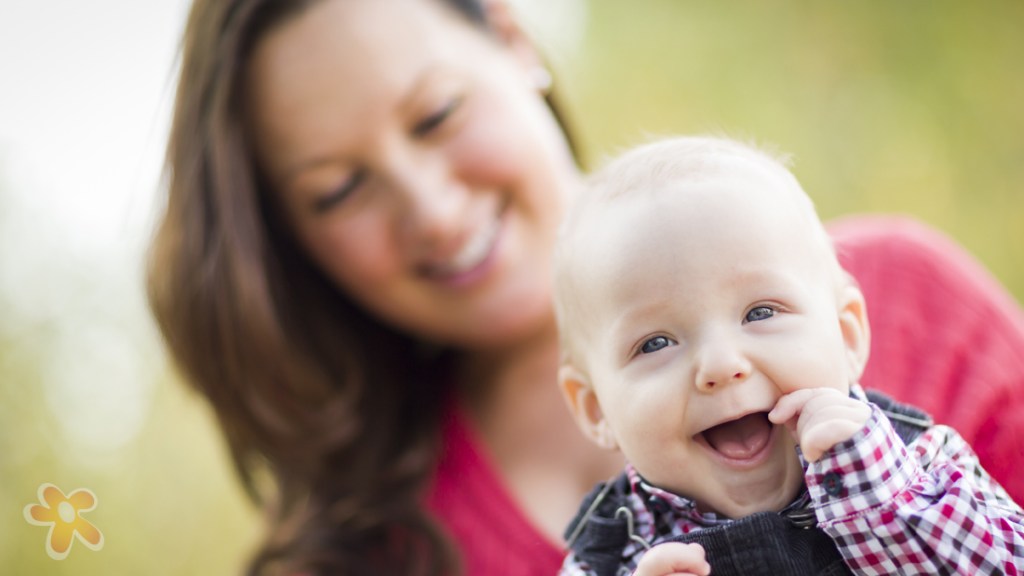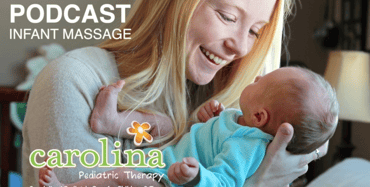Talking to Your Baby
As a new mother, I know it can be overwhelming to make sure I'm doing everything my child needs, and to keep up with all the things he should be doing by now. As a speech-language pathologist, I at least know where he should be with his speech sounds and language skills!
And there is one thing every parent can do that is really one of the best ways to help your baby’s development: Talk to him!
“Why should I talk to him? He’s just a baby!”
Even though your baby can’t talk with you using real words, his little brain is constantly working, ready to absorb everything he can. He hears you when you talk to him, and he sees your face when you talk to him. With this interaction, he learns about the back-and-forth of conversation and social skills, and he learns the sounds and the flow of language. All this learning means that when it’s time (around his first birthday), he will be ready to say his first real word! And after that, the words will just keep coming!
“Okay, but how should I talk to him? I feel so silly!”
You may feel silly at first, but just keep trying! Here are some ways to do it:
“Motherese” or “Parentese”: This is NOT the same thing as “baby talk.” “Parentese” means talking to your child in real words and full sentences, but using a higher pitch (even just a slightly higher pitch), lots of repetition, and speaking very clearly and more slowly than usual. “Baby talk,” on the other hand, means talking in nonsense words, and is not helpful to anyone. The higher pitch of “parentese” gets your baby’s attention, so he know you’re talking to him. The repetition–along with the slow rate and clear enunciation–helps him to learn the sounds and rhythm of how we talk. Here is an example of “parentese”: “Hi there! I see you! Are you happy today? Are you? Are you happy? I hope so! Is that a smile? Are you going to smile? Oh, there’s a smile! I love that smile!” Or at bath time, “Look at you in the tub! Do you like the water? Does that water feel good? I’m going to wash your feet! Here’s one foot–I’m getting it all clean! And here’s the other foot–now it’s all clean, too! Let’s wash your belly. Now your belly is all clean!” (And so on.)
Commentating: Talk about what you’re doing while you’re doing it. This gives your baby lots of opportunities to hear those sounds and see how we use them to communicate.
Back-and-forth: Whenever possible, pretend you are actually having a conversation with him. I like to say something to my baby or ask him a question, then pause to give him a chance to “respond.” If he just smiles, I comment on that. If he makes a noise, I pretend it was an answer, and I respond back to him. (Depending on the sound he makes, I like to pretend it was the start of a real word, and I repeat what that “word” was, then answer him. For example, I might say, “Are you having a good day?” Then pause, and if he makes a “g” sound, I might respond, “‘Good?’ You are having a good day? I’m so glad!” Then pause again to let him “say” something else, and continue with this as if we are really having a conversation.)
Details: Use a lot of descriptions, to let your baby hear as many different words as possible. For instance, if you see a dog when you’re out for a walk, say, “Look, there’s a dog! It’s a big yellow dog. That dog has a long fluffy tail, and his tongue is sticking out! That’s funny! That dog is funny, isn’t he? And he’s a pretty dog, too!”
“All right, but when should I do this? I’m so busy, you know!”
Oh, I know! Having a new baby means learning just how few hours are in a day! But start by using the opportunities you already have. Here are some examples:
Changing diapers: This is a wonderful time for talking with your baby, because your faces can be very close, so he can watch you talking to him and can really see you clearly. I have many great “conversations” with my baby while I’m changing his diaper!
Taking baths: Again, this is a great time for talking, because you both stay in pretty much the same position and can see each other’s faces so clearly. And bath time can be so much fun!
Getting ready for bed: While getting my baby ready to go to sleep, I like to sing to him, or read him a book. Songs are a wonderful way to promote language development from day one, because of the rhymes, steady rhythm, repetition—and because music is just great to make and to listen to—and even a newborn can benefit from being read to! At this age, read him the book and show him the pictures (or try to!), and read some of the same books over and over, as you like (not necessarily in the same day!). As he gets older, point to each word as you read, and start involving your child in the book: Read with him, not just to him.
Tummy time or play mat time: Get down on the floor with your baby when he has tummy time or play mat time, and talk with him there!
When you’re out for a walk: Talk to your baby about what you see as you walk around!
When you’re driving: Talk about what you see by the sides of the road, or the other cars, or where you’re going, or what you plan to do that day, etc.
Finally, remember that our brains need some quiet time every day—and this is especially important for little ones! Talk to your baby, but don’t talk constantly.
Basically, it’s just important to start talking to your baby, however and whenever you think of it. With lots of practice, it will start coming more easily. And I can tell you, when he starts “talking” back, it just makes your heart swell! I love hearing my baby blow bubbles, starting to blow raspberries, coo, experiment with different sounds and noises, and trying to “talk” to me! And I especially love seeing each smile and hearing every laugh.
Talking to Your Baby
Teresa Davis, MS, CCC-SLP
Sources: ASHA.org | MedicalXpress.com | Jade.MarinSchools.org
Teresa Davis is a licensed speech-language pathologist who is passionate about helping children of all ages to communicate and has been with Carolina Pediatric Therapy since March of 2014. She received her Masters in Communication Sciences and Disorders from Western Carolina University.
Want to know how a Therapist can Help?
Call (828) 398 0043 or click on the schedule button.



